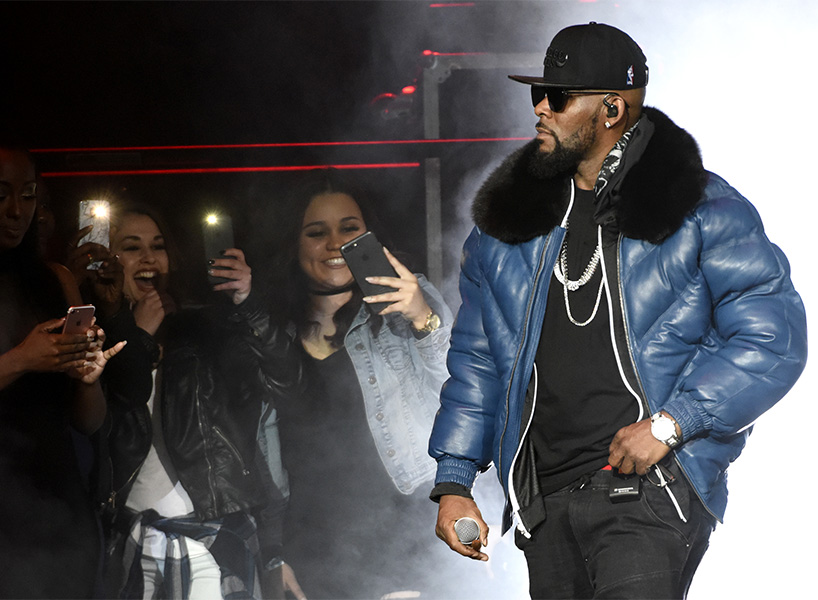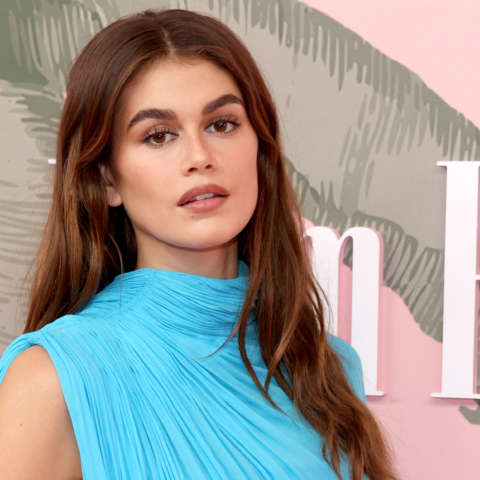Opinion: We Should Use the Right Word for R. Kelly’s Alleged Actions, and That’s Trafficking
Because language matters


Like many people, I couldn’t look away from Lifetime’s six-part docuseries, Surviving R. Kelly.
Unlike most viewers, though, I wasn’t binge-watching because I couldn’t believe the stories of sexual abuse and exploitation. I was watching because I could. As young woman after young woman appeared on my TV screen, bravely speaking out about being manipulated, used and exploited, I couldn’t help but remember being a teenager myself, under the control of pimps and trapped in Ontario’s underground sex industry.
My trafficker, who I’ll call John, didn’t keep me confined to hotel rooms and suburban mansions, as the women who appeared in Surviving R. Kelly have accused the R&B icon of doing. He forced me to dance in strip clubs, instead. But if the docuseries is accurate—and I do believe it is—that may be the only real difference between John’s actions and Kelly’s. (Kelly has always denied the allegations against him, and has never been convicted of a crime.)
What we mean when we talk about trafficking
According to Public Safety Canada, human trafficking is “the recruitment, transportation, harbouring and/or exercising control, direction or influence over the movements of a person to exploit that person, typically through sexual exploitation or forced labour.” It doesn’t always look the same, and it doesn’t always involve sex work—forced labour and forced marriage count as trafficking, too. And it’s a growing problem: In the U.S., the National Human Trafficking Hotline says it received 5,147 reports of human trafficking in 2018. Closer to home, ”the number and rate of human trafficking incidents have steadily increased since 2010,” according to Statistics Canada. In 2016, there were 0.94 police-reported incidents of human trafficking for every 100,000 Canadians, which is the highest rate since 2009, when the government began tracking this problem.
—And It Could Happen to *Anyone*
We don’t talk about trafficking enough, though. That’s why I was glad Cyntoia Brown’s story prompted so much discussion. In 2006, at just 16, Brown was convicted of killing a 43-year-old man who bought her for sex and sentenced to life in prison with no possibility of parole for 51 years. In 2017, her story went viral after celebrities like Rihanna, Kim Kardashian and Amy Schumer posted messages of support on social media using the #FreeCyntoiaBrown hashtag.
https://www.instagram.com/p/Bbwi26PjHf7
Then, just days after the January 4 premiere of Surviving R. Kelly, Brown was granted clemency. The news was met with so much celebration that I was sure trafficking would become a mainstream conversation—and that we’d make the connection between what happened to her, and what the women in the docuseries say happened to them. But with a few exceptions, that hasn’t really happened.
“R. Kelly’s girls” may not *seem* like trafficking victims, but they fit the definition
Brown is a more obvious example of human trafficking: She was a young, homeless teen lured by a violent pimp who forced her into prostitution through a combination of intimidation and violence. The allegations against Kelly, on the other hand, are harder to understand as trafficking, mainly because his accusers’ stories don’t align with our perception of what it looks like.
The Polaris Project, an American non-profit dedicated to ending modern-day slavery and trafficking, says there are several misconceptions that continue to endure, including that idea that trafficking involves kidnapping or violent crime, that trafficked people are locked or held against their will and that it always involves commercial sex. Human trafficking can include these circumstances, of course. But it doesn’t have to. For example, I was never subjected to physical violence, even though John was brutally violent with other girls. But I was still trafficked.
That’s because more than violence, more than sex, control is the key element of human trafficking—and, according to the women in Surviving R. Kelly, it’s a key part of Kelly’s behaviour, too. Throughout the docuseries, women who were involved with the singer at completely different times shared consistent accounts of abuse, saying Kelly told them what to wear, when to speak and who they should have sex with. Some even recalled being locked in their rooms and denied food or access to a bathroom, sometimes for days at a time.
Here’s why it’s hard to use the word “trafficking”
I’m not the only one who has noticed the similarities between how traffickers behave and what the women in the docuseries say Kelly did to them; according to the Washington Post, Kim Mehlman-Orozco, an expert in sex trafficking cases, “was struck by the similarities from the accusations in the Surviving R. Kelly documentary and the stories told by convicted sex traffickers, [saying,] ‘These sex traffickers didn’t allow women to talk to each other, and the traffickers compared themselves to God.'”
‘t enough. I believe when we discuss R. Kelly, we must we use the correct language. We need to call his alleged behaviour trafficking, because calling it anything else minimizes the criminality of these actions. Surviving R. Kelly isn’t talking about a man who simply mistreats women; it’s talking about a man who has expertly targeted, groomed and exploited the naïveté of countless Black women and girls by exerting an extreme level of control and manipulation.
It can be surprisingly difficult to use this language to describe Kelly, though. Against all the odds, there are still those who believe the “Pied Piper of R&B” is innocent. (Yes, even with that nickname, and in the age of #MeToo.) Perhaps this is because too many people, even within the Black community, still believe that the young Black women and girls who say he abused them were willing participants.
But the idea that these young Black women and girls are complicit in their own abuse is a sign of a larger problem: Society still doesn’t believe Black women and girls, nor does it prioritize their pain. As journalist Jim DeRogatis, whose coverage of R. Kelly’s alleged predation spans two decades, said in a 2013 interview with the Village Voice, “The saddest fact I’ve learned is nobody matters less to our society than young black women. Nobody.” Jemele Hill reiterates the point in a recent Atlantic column on the Black community’s protection of Kelly, saying, “Black girls and women are often on their own in fighting abuse and misogynoir.”
Surviving R. Kelly shows the impact of emotional abuse
But I think people also blame these young women and girls for their own emotional and mental abuse because they don’t understand the impact it has. I know from my own experience in “the life,” and the experiences of the young women and girls I work with today, that physical violence is not unheard of—but there are also other forms of control. Traffickers will intentionally seek out vulnerable victims, many times taking on the role of a boyfriend, father figure or protector. Some may make promises of financial security or a glamorous lifestyle. They’ll also exert control in other ways, including making their victims fear them, playing mind games and isolating them from friends and family.
‘s Response to Sexual Assault Allegations? A Song Called ‘I Admit’
I was one of the lucky ones. I escaped my traffickers after a few months, and I was able to rebuild my life. It wasn’t easy and I suffered many setbacks, but I was eventually able to return to school to complete both a bachelor’s degree and a master’s of science. I now work as an advocate and wellness educator for survivors of human trafficking and vulnerable youth. My hope is that, thanks to the women who spearheaded the #MuteRKelly movement and executive producer Dream Hampton and the team behind Surviving R. Kelly, Kelly will finally face consequences for his alleged actions, and that “R. Kelly’s girls” will have the same chance to rebuild their lives as I did.
But I also hope our conversations around Kelly—and Cyntoia Brown, for that matter—will allow us to question our own beliefs about victims and perpetrators. And more importantly, that they’ll help us stop ignoring trafficking wherever it’s found, whether that’s in Hollywood, or in the suburbs of Chicago, or in our own backyard. It’s up to all of us to say that, as a society, we will not tolerate the exploitation of women and girls and demand policies and punishments fitting to these crimes. Only then can we truly address the problem at hand and finally #EndHumanTrafficking.
Rhonelle Bruder is an educator, advocate and the founder of the Rise Initiative, a grassroots project that supports vulnerable youth, particularly survivors of human trafficking.








